Organisational Behaviour Report: Emotions, Leadership Skills Analysis
VerifiedAdded on 2022/09/09
|7
|2192
|26
Report
AI Summary
This report delves into the critical roles of emotions and leadership within an organisational context. It begins by exploring the significance of emotions in the workplace, highlighting their impact on employee motivation, job satisfaction, and overall performance. The report examines the positive and negative outcomes associated with employee emotions, drawing upon key theoretical perspectives such as the Affective Events Theory and the Broaden and Build Theory to explain these dynamics. The second part of the report shifts its focus to leadership, analysing the attributes and behaviours that define an ideal leader. It considers various leadership theories, including Path-goal theory, LMX theory, and transformational leadership, to identify essential traits and the influence of situational factors on leader effectiveness. The analysis underscores the importance of strong leadership skills and how these skills contribute to organisational success.
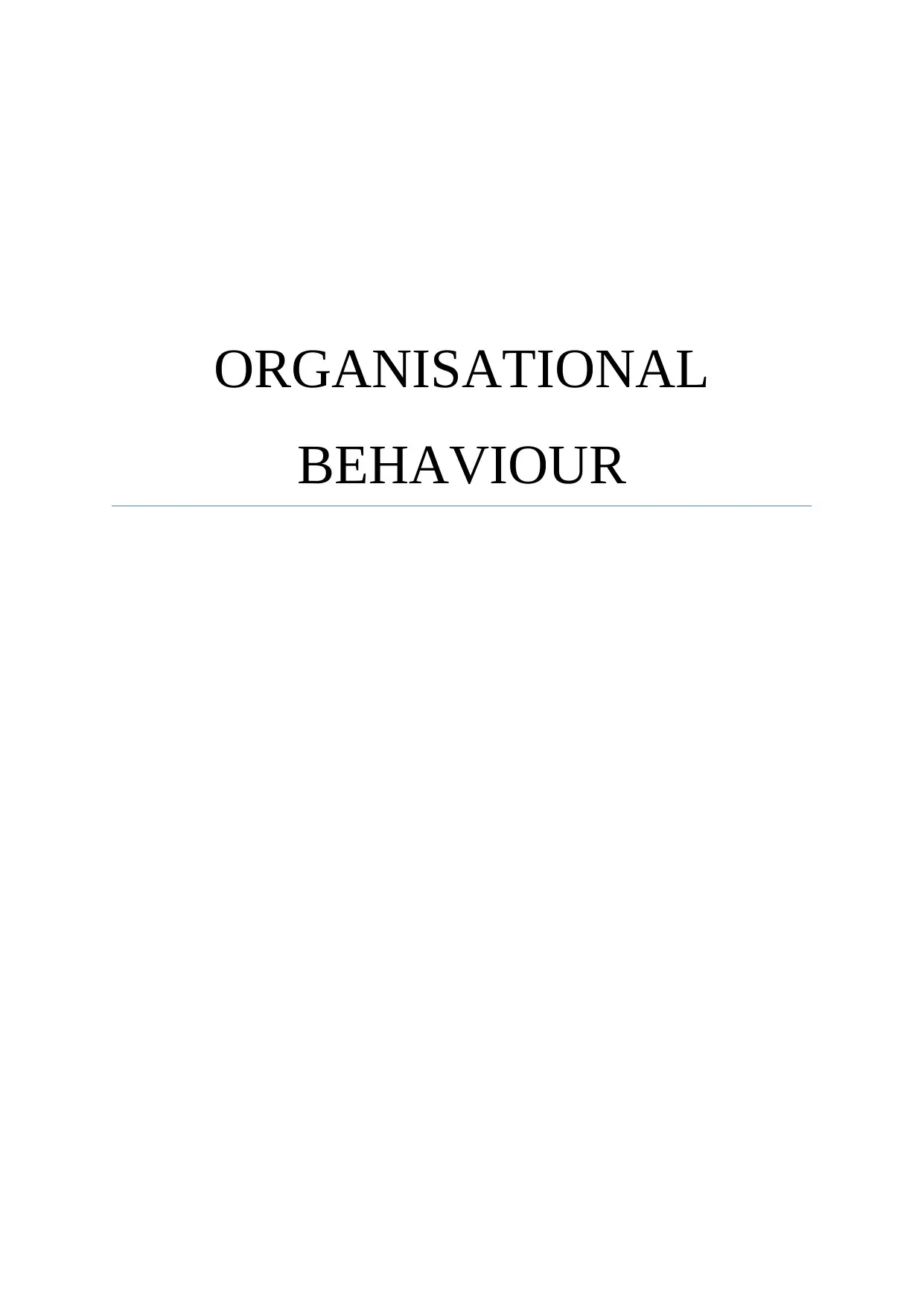
ORGANISATIONAL
BEHAVIOUR
BEHAVIOUR
Paraphrase This Document
Need a fresh take? Get an instant paraphrase of this document with our AI Paraphraser
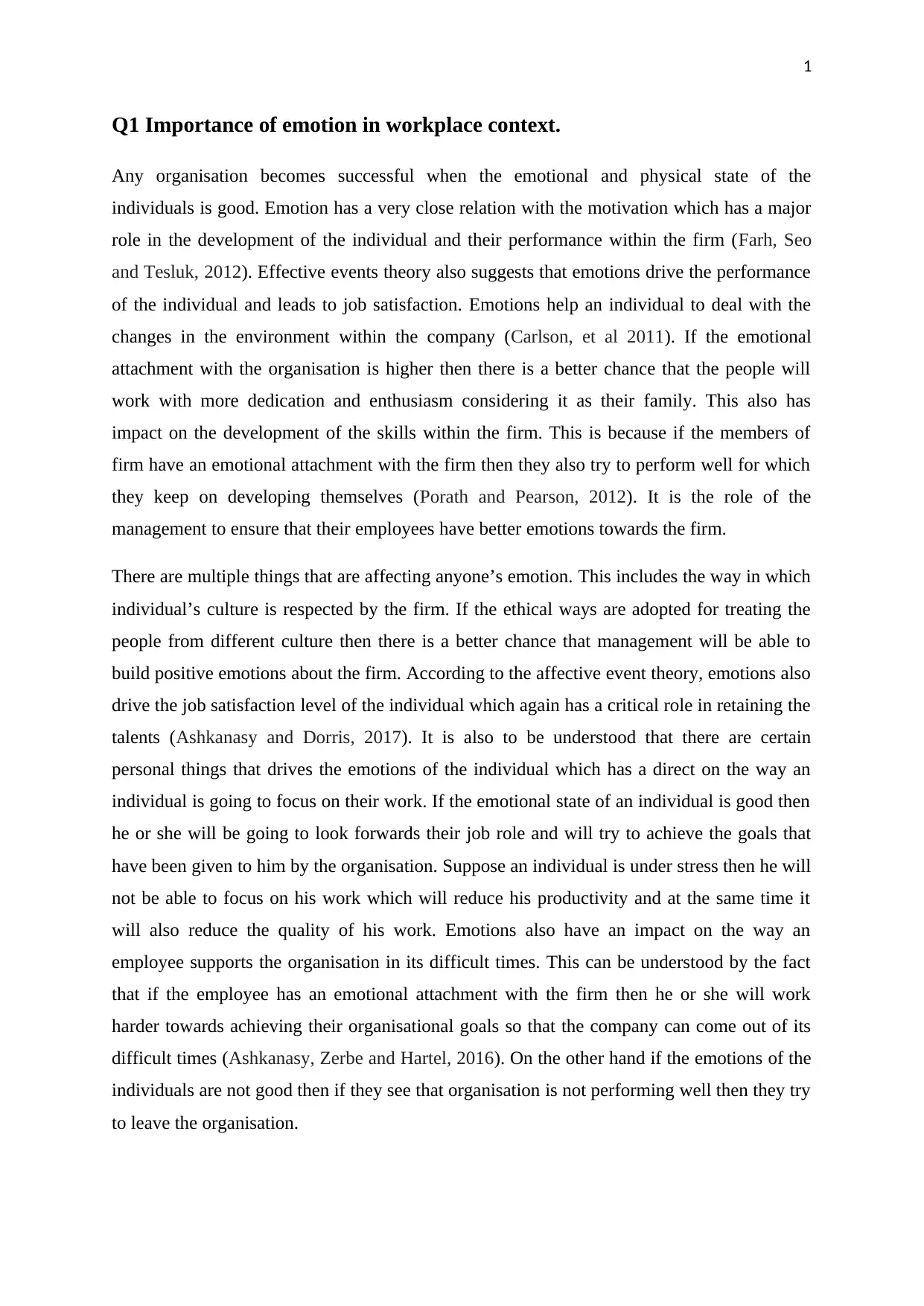
1
Q1 Importance of emotion in workplace context.
Any organisation becomes successful when the emotional and physical state of the
individuals is good. Emotion has a very close relation with the motivation which has a major
role in the development of the individual and their performance within the firm (Farh, Seo
and Tesluk, 2012). Effective events theory also suggests that emotions drive the performance
of the individual and leads to job satisfaction. Emotions help an individual to deal with the
changes in the environment within the company (Carlson, et al 2011). If the emotional
attachment with the organisation is higher then there is a better chance that the people will
work with more dedication and enthusiasm considering it as their family. This also has
impact on the development of the skills within the firm. This is because if the members of
firm have an emotional attachment with the firm then they also try to perform well for which
they keep on developing themselves (Porath and Pearson, 2012). It is the role of the
management to ensure that their employees have better emotions towards the firm.
There are multiple things that are affecting anyone’s emotion. This includes the way in which
individual’s culture is respected by the firm. If the ethical ways are adopted for treating the
people from different culture then there is a better chance that management will be able to
build positive emotions about the firm. According to the affective event theory, emotions also
drive the job satisfaction level of the individual which again has a critical role in retaining the
talents (Ashkanasy and Dorris, 2017). It is also to be understood that there are certain
personal things that drives the emotions of the individual which has a direct on the way an
individual is going to focus on their work. If the emotional state of an individual is good then
he or she will be going to look forwards their job role and will try to achieve the goals that
have been given to him by the organisation. Suppose an individual is under stress then he will
not be able to focus on his work which will reduce his productivity and at the same time it
will also reduce the quality of his work. Emotions also have an impact on the way an
employee supports the organisation in its difficult times. This can be understood by the fact
that if the employee has an emotional attachment with the firm then he or she will work
harder towards achieving their organisational goals so that the company can come out of its
difficult times (Ashkanasy, Zerbe and Hartel, 2016). On the other hand if the emotions of the
individuals are not good then if they see that organisation is not performing well then they try
to leave the organisation.
Q1 Importance of emotion in workplace context.
Any organisation becomes successful when the emotional and physical state of the
individuals is good. Emotion has a very close relation with the motivation which has a major
role in the development of the individual and their performance within the firm (Farh, Seo
and Tesluk, 2012). Effective events theory also suggests that emotions drive the performance
of the individual and leads to job satisfaction. Emotions help an individual to deal with the
changes in the environment within the company (Carlson, et al 2011). If the emotional
attachment with the organisation is higher then there is a better chance that the people will
work with more dedication and enthusiasm considering it as their family. This also has
impact on the development of the skills within the firm. This is because if the members of
firm have an emotional attachment with the firm then they also try to perform well for which
they keep on developing themselves (Porath and Pearson, 2012). It is the role of the
management to ensure that their employees have better emotions towards the firm.
There are multiple things that are affecting anyone’s emotion. This includes the way in which
individual’s culture is respected by the firm. If the ethical ways are adopted for treating the
people from different culture then there is a better chance that management will be able to
build positive emotions about the firm. According to the affective event theory, emotions also
drive the job satisfaction level of the individual which again has a critical role in retaining the
talents (Ashkanasy and Dorris, 2017). It is also to be understood that there are certain
personal things that drives the emotions of the individual which has a direct on the way an
individual is going to focus on their work. If the emotional state of an individual is good then
he or she will be going to look forwards their job role and will try to achieve the goals that
have been given to him by the organisation. Suppose an individual is under stress then he will
not be able to focus on his work which will reduce his productivity and at the same time it
will also reduce the quality of his work. Emotions also have an impact on the way an
employee supports the organisation in its difficult times. This can be understood by the fact
that if the employee has an emotional attachment with the firm then he or she will work
harder towards achieving their organisational goals so that the company can come out of its
difficult times (Ashkanasy, Zerbe and Hartel, 2016). On the other hand if the emotions of the
individuals are not good then if they see that organisation is not performing well then they try
to leave the organisation.
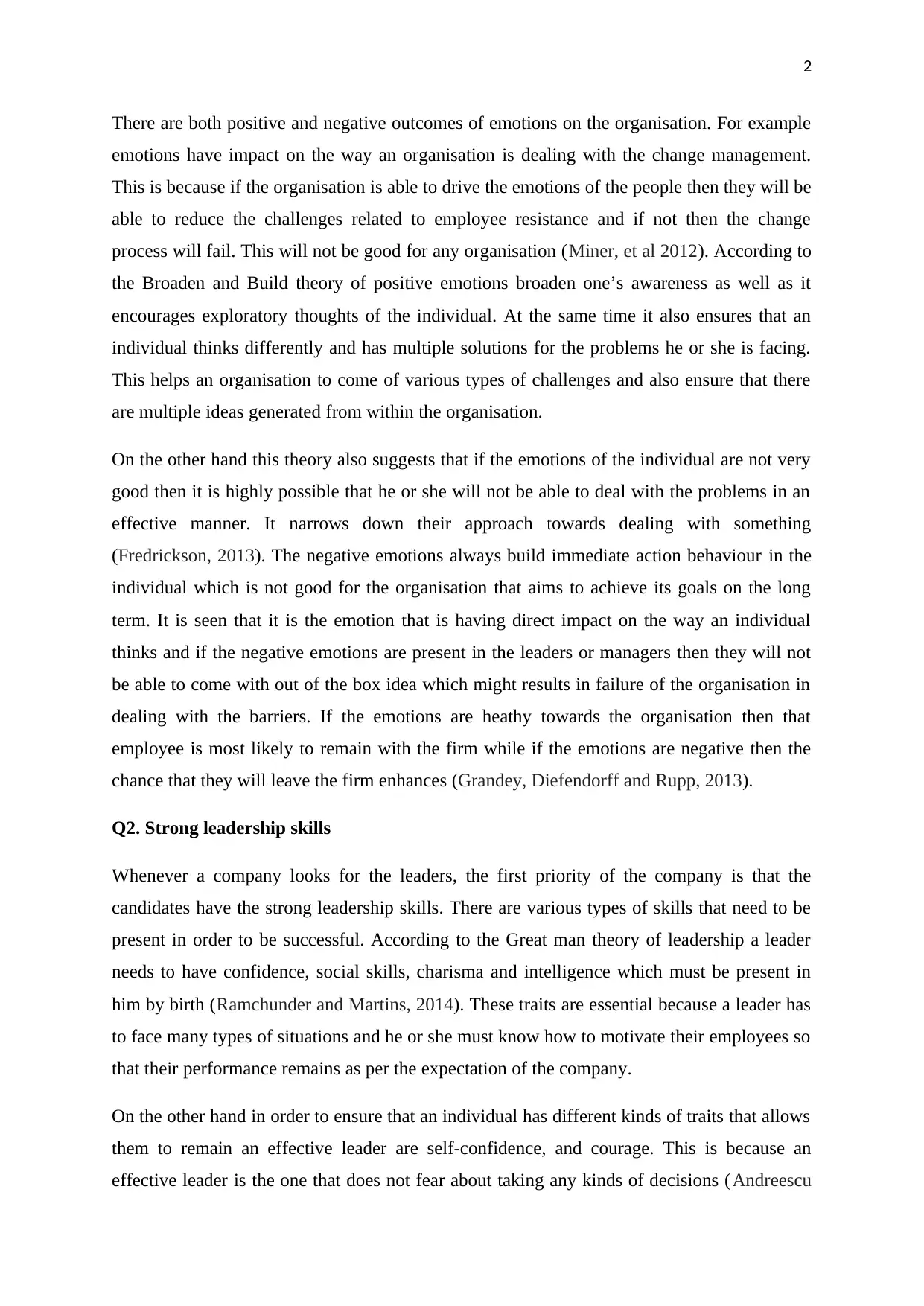
2
There are both positive and negative outcomes of emotions on the organisation. For example
emotions have impact on the way an organisation is dealing with the change management.
This is because if the organisation is able to drive the emotions of the people then they will be
able to reduce the challenges related to employee resistance and if not then the change
process will fail. This will not be good for any organisation (Miner, et al 2012). According to
the Broaden and Build theory of positive emotions broaden one’s awareness as well as it
encourages exploratory thoughts of the individual. At the same time it also ensures that an
individual thinks differently and has multiple solutions for the problems he or she is facing.
This helps an organisation to come of various types of challenges and also ensure that there
are multiple ideas generated from within the organisation.
On the other hand this theory also suggests that if the emotions of the individual are not very
good then it is highly possible that he or she will not be able to deal with the problems in an
effective manner. It narrows down their approach towards dealing with something
(Fredrickson, 2013). The negative emotions always build immediate action behaviour in the
individual which is not good for the organisation that aims to achieve its goals on the long
term. It is seen that it is the emotion that is having direct impact on the way an individual
thinks and if the negative emotions are present in the leaders or managers then they will not
be able to come with out of the box idea which might results in failure of the organisation in
dealing with the barriers. If the emotions are heathy towards the organisation then that
employee is most likely to remain with the firm while if the emotions are negative then the
chance that they will leave the firm enhances (Grandey, Diefendorff and Rupp, 2013).
Q2. Strong leadership skills
Whenever a company looks for the leaders, the first priority of the company is that the
candidates have the strong leadership skills. There are various types of skills that need to be
present in order to be successful. According to the Great man theory of leadership a leader
needs to have confidence, social skills, charisma and intelligence which must be present in
him by birth (Ramchunder and Martins, 2014). These traits are essential because a leader has
to face many types of situations and he or she must know how to motivate their employees so
that their performance remains as per the expectation of the company.
On the other hand in order to ensure that an individual has different kinds of traits that allows
them to remain an effective leader are self-confidence, and courage. This is because an
effective leader is the one that does not fear about taking any kinds of decisions (Andreescu
There are both positive and negative outcomes of emotions on the organisation. For example
emotions have impact on the way an organisation is dealing with the change management.
This is because if the organisation is able to drive the emotions of the people then they will be
able to reduce the challenges related to employee resistance and if not then the change
process will fail. This will not be good for any organisation (Miner, et al 2012). According to
the Broaden and Build theory of positive emotions broaden one’s awareness as well as it
encourages exploratory thoughts of the individual. At the same time it also ensures that an
individual thinks differently and has multiple solutions for the problems he or she is facing.
This helps an organisation to come of various types of challenges and also ensure that there
are multiple ideas generated from within the organisation.
On the other hand this theory also suggests that if the emotions of the individual are not very
good then it is highly possible that he or she will not be able to deal with the problems in an
effective manner. It narrows down their approach towards dealing with something
(Fredrickson, 2013). The negative emotions always build immediate action behaviour in the
individual which is not good for the organisation that aims to achieve its goals on the long
term. It is seen that it is the emotion that is having direct impact on the way an individual
thinks and if the negative emotions are present in the leaders or managers then they will not
be able to come with out of the box idea which might results in failure of the organisation in
dealing with the barriers. If the emotions are heathy towards the organisation then that
employee is most likely to remain with the firm while if the emotions are negative then the
chance that they will leave the firm enhances (Grandey, Diefendorff and Rupp, 2013).
Q2. Strong leadership skills
Whenever a company looks for the leaders, the first priority of the company is that the
candidates have the strong leadership skills. There are various types of skills that need to be
present in order to be successful. According to the Great man theory of leadership a leader
needs to have confidence, social skills, charisma and intelligence which must be present in
him by birth (Ramchunder and Martins, 2014). These traits are essential because a leader has
to face many types of situations and he or she must know how to motivate their employees so
that their performance remains as per the expectation of the company.
On the other hand in order to ensure that an individual has different kinds of traits that allows
them to remain an effective leader are self-confidence, and courage. This is because an
effective leader is the one that does not fear about taking any kinds of decisions (Andreescu
⊘ This is a preview!⊘
Do you want full access?
Subscribe today to unlock all pages.

Trusted by 1+ million students worldwide
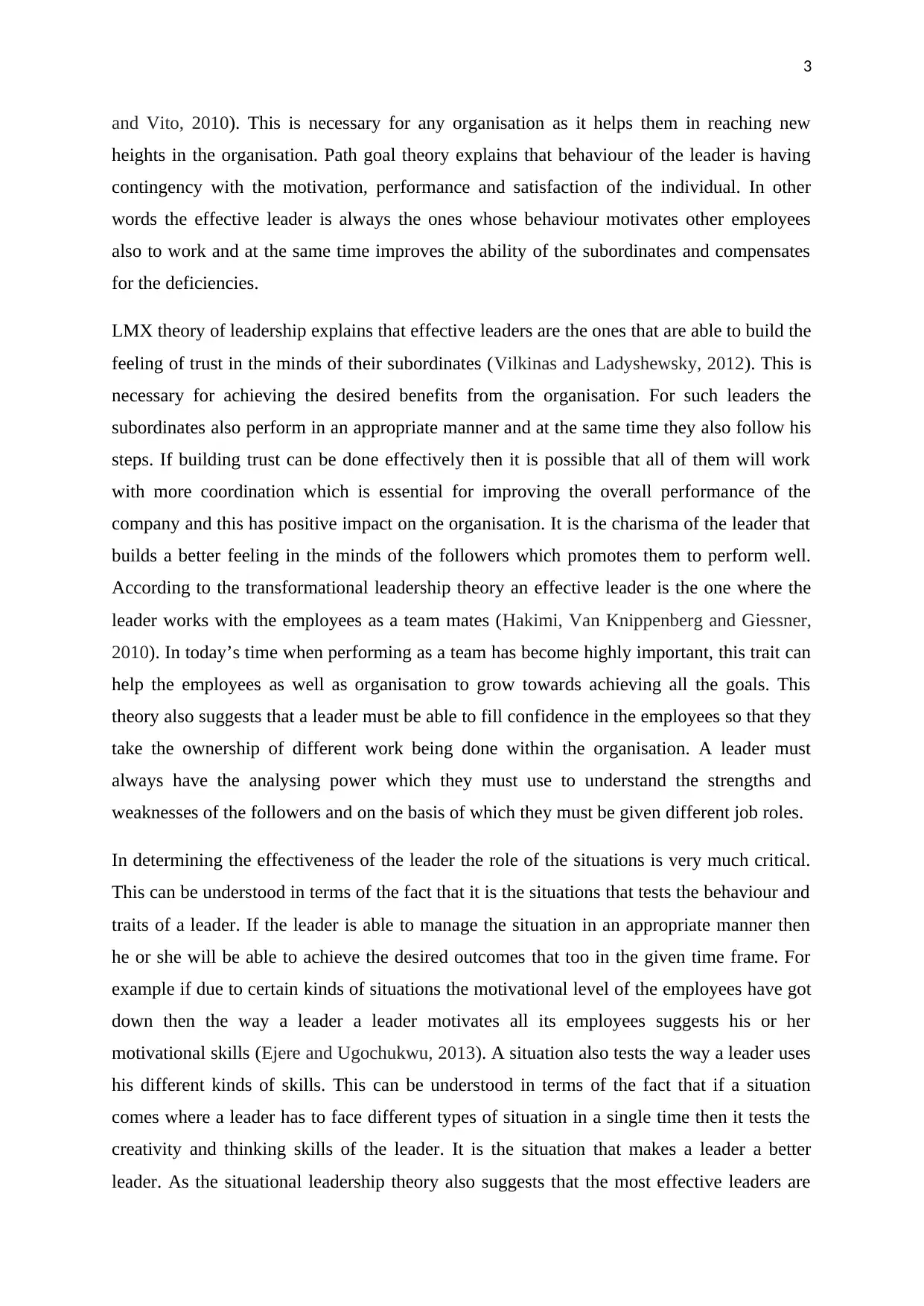
3
and Vito, 2010). This is necessary for any organisation as it helps them in reaching new
heights in the organisation. Path goal theory explains that behaviour of the leader is having
contingency with the motivation, performance and satisfaction of the individual. In other
words the effective leader is always the ones whose behaviour motivates other employees
also to work and at the same time improves the ability of the subordinates and compensates
for the deficiencies.
LMX theory of leadership explains that effective leaders are the ones that are able to build the
feeling of trust in the minds of their subordinates (Vilkinas and Ladyshewsky, 2012). This is
necessary for achieving the desired benefits from the organisation. For such leaders the
subordinates also perform in an appropriate manner and at the same time they also follow his
steps. If building trust can be done effectively then it is possible that all of them will work
with more coordination which is essential for improving the overall performance of the
company and this has positive impact on the organisation. It is the charisma of the leader that
builds a better feeling in the minds of the followers which promotes them to perform well.
According to the transformational leadership theory an effective leader is the one where the
leader works with the employees as a team mates (Hakimi, Van Knippenberg and Giessner,
2010). In today’s time when performing as a team has become highly important, this trait can
help the employees as well as organisation to grow towards achieving all the goals. This
theory also suggests that a leader must be able to fill confidence in the employees so that they
take the ownership of different work being done within the organisation. A leader must
always have the analysing power which they must use to understand the strengths and
weaknesses of the followers and on the basis of which they must be given different job roles.
In determining the effectiveness of the leader the role of the situations is very much critical.
This can be understood in terms of the fact that it is the situations that tests the behaviour and
traits of a leader. If the leader is able to manage the situation in an appropriate manner then
he or she will be able to achieve the desired outcomes that too in the given time frame. For
example if due to certain kinds of situations the motivational level of the employees have got
down then the way a leader a leader motivates all its employees suggests his or her
motivational skills (Ejere and Ugochukwu, 2013). A situation also tests the way a leader uses
his different kinds of skills. This can be understood in terms of the fact that if a situation
comes where a leader has to face different types of situation in a single time then it tests the
creativity and thinking skills of the leader. It is the situation that makes a leader a better
leader. As the situational leadership theory also suggests that the most effective leaders are
and Vito, 2010). This is necessary for any organisation as it helps them in reaching new
heights in the organisation. Path goal theory explains that behaviour of the leader is having
contingency with the motivation, performance and satisfaction of the individual. In other
words the effective leader is always the ones whose behaviour motivates other employees
also to work and at the same time improves the ability of the subordinates and compensates
for the deficiencies.
LMX theory of leadership explains that effective leaders are the ones that are able to build the
feeling of trust in the minds of their subordinates (Vilkinas and Ladyshewsky, 2012). This is
necessary for achieving the desired benefits from the organisation. For such leaders the
subordinates also perform in an appropriate manner and at the same time they also follow his
steps. If building trust can be done effectively then it is possible that all of them will work
with more coordination which is essential for improving the overall performance of the
company and this has positive impact on the organisation. It is the charisma of the leader that
builds a better feeling in the minds of the followers which promotes them to perform well.
According to the transformational leadership theory an effective leader is the one where the
leader works with the employees as a team mates (Hakimi, Van Knippenberg and Giessner,
2010). In today’s time when performing as a team has become highly important, this trait can
help the employees as well as organisation to grow towards achieving all the goals. This
theory also suggests that a leader must be able to fill confidence in the employees so that they
take the ownership of different work being done within the organisation. A leader must
always have the analysing power which they must use to understand the strengths and
weaknesses of the followers and on the basis of which they must be given different job roles.
In determining the effectiveness of the leader the role of the situations is very much critical.
This can be understood in terms of the fact that it is the situations that tests the behaviour and
traits of a leader. If the leader is able to manage the situation in an appropriate manner then
he or she will be able to achieve the desired outcomes that too in the given time frame. For
example if due to certain kinds of situations the motivational level of the employees have got
down then the way a leader a leader motivates all its employees suggests his or her
motivational skills (Ejere and Ugochukwu, 2013). A situation also tests the way a leader uses
his different kinds of skills. This can be understood in terms of the fact that if a situation
comes where a leader has to face different types of situation in a single time then it tests the
creativity and thinking skills of the leader. It is the situation that makes a leader a better
leader. As the situational leadership theory also suggests that the most effective leaders are
Paraphrase This Document
Need a fresh take? Get an instant paraphrase of this document with our AI Paraphraser
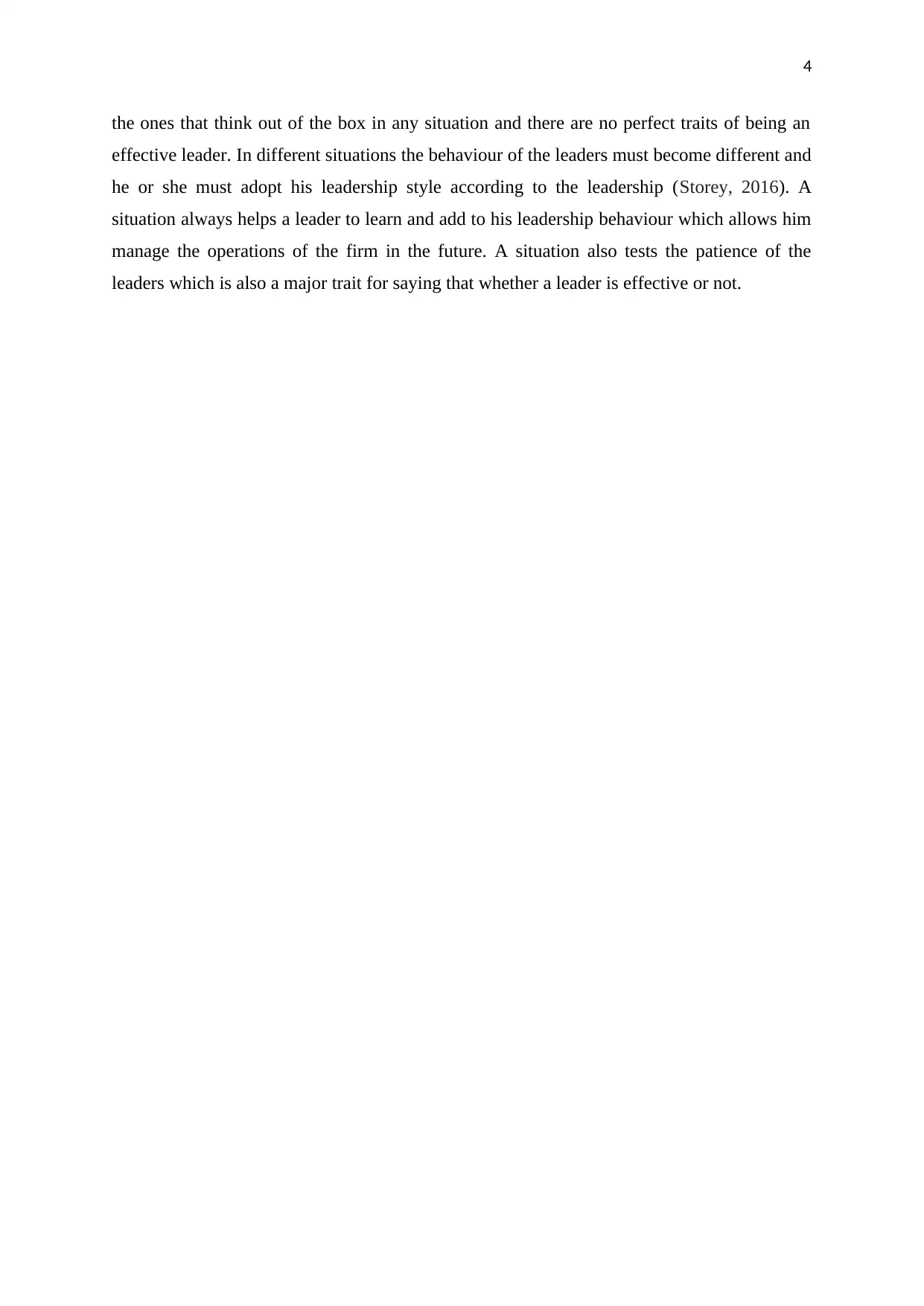
4
the ones that think out of the box in any situation and there are no perfect traits of being an
effective leader. In different situations the behaviour of the leaders must become different and
he or she must adopt his leadership style according to the leadership (Storey, 2016). A
situation always helps a leader to learn and add to his leadership behaviour which allows him
manage the operations of the firm in the future. A situation also tests the patience of the
leaders which is also a major trait for saying that whether a leader is effective or not.
the ones that think out of the box in any situation and there are no perfect traits of being an
effective leader. In different situations the behaviour of the leaders must become different and
he or she must adopt his leadership style according to the leadership (Storey, 2016). A
situation always helps a leader to learn and add to his leadership behaviour which allows him
manage the operations of the firm in the future. A situation also tests the patience of the
leaders which is also a major trait for saying that whether a leader is effective or not.
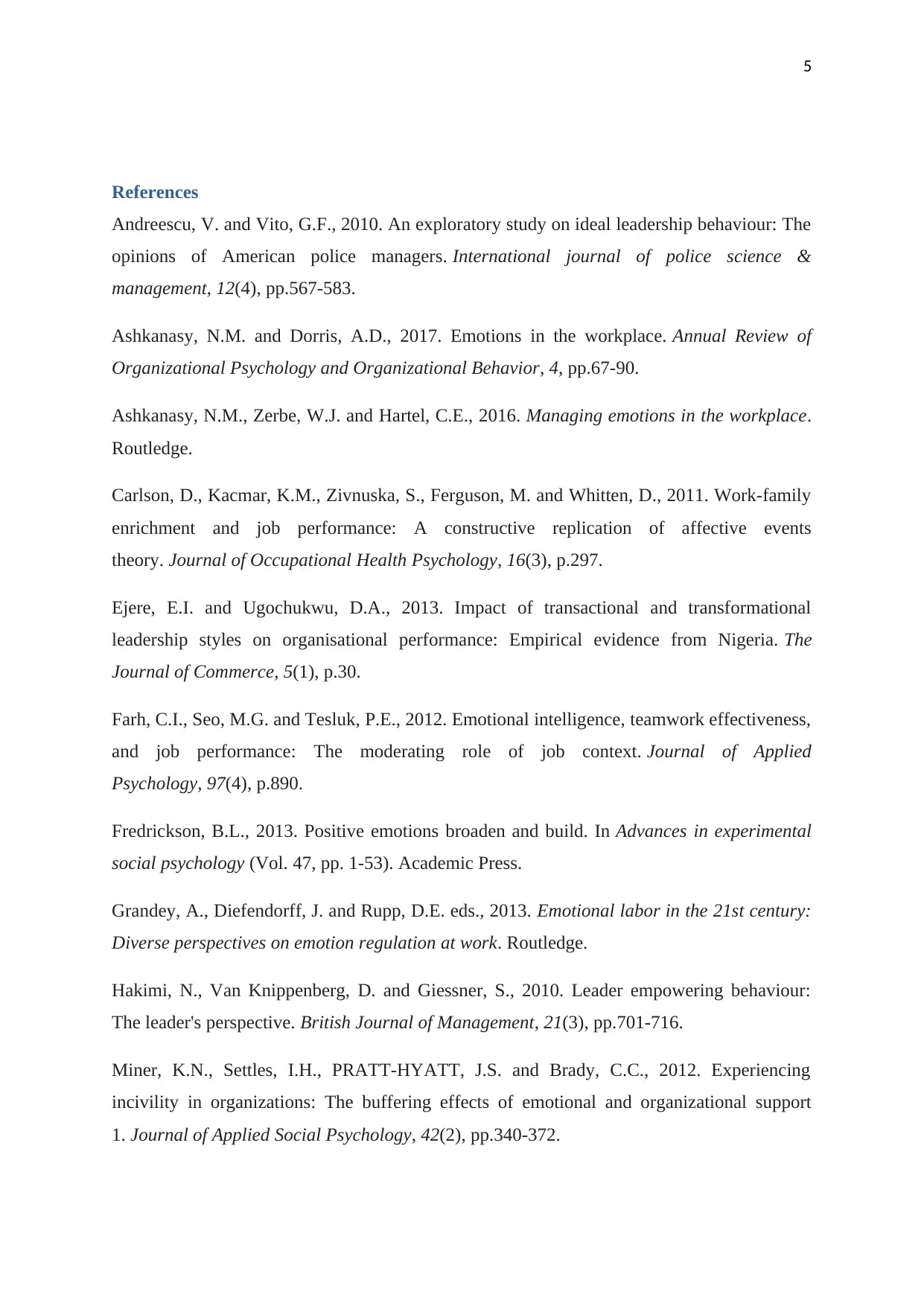
5
References
Andreescu, V. and Vito, G.F., 2010. An exploratory study on ideal leadership behaviour: The
opinions of American police managers. International journal of police science &
management, 12(4), pp.567-583.
Ashkanasy, N.M. and Dorris, A.D., 2017. Emotions in the workplace. Annual Review of
Organizational Psychology and Organizational Behavior, 4, pp.67-90.
Ashkanasy, N.M., Zerbe, W.J. and Hartel, C.E., 2016. Managing emotions in the workplace.
Routledge.
Carlson, D., Kacmar, K.M., Zivnuska, S., Ferguson, M. and Whitten, D., 2011. Work-family
enrichment and job performance: A constructive replication of affective events
theory. Journal of Occupational Health Psychology, 16(3), p.297.
Ejere, E.I. and Ugochukwu, D.A., 2013. Impact of transactional and transformational
leadership styles on organisational performance: Empirical evidence from Nigeria. The
Journal of Commerce, 5(1), p.30.
Farh, C.I., Seo, M.G. and Tesluk, P.E., 2012. Emotional intelligence, teamwork effectiveness,
and job performance: The moderating role of job context. Journal of Applied
Psychology, 97(4), p.890.
Fredrickson, B.L., 2013. Positive emotions broaden and build. In Advances in experimental
social psychology (Vol. 47, pp. 1-53). Academic Press.
Grandey, A., Diefendorff, J. and Rupp, D.E. eds., 2013. Emotional labor in the 21st century:
Diverse perspectives on emotion regulation at work. Routledge.
Hakimi, N., Van Knippenberg, D. and Giessner, S., 2010. Leader empowering behaviour:
The leader's perspective. British Journal of Management, 21(3), pp.701-716.
Miner, K.N., Settles, I.H., PRATT‐HYATT, J.S. and Brady, C.C., 2012. Experiencing
incivility in organizations: The buffering effects of emotional and organizational support
1. Journal of Applied Social Psychology, 42(2), pp.340-372.
References
Andreescu, V. and Vito, G.F., 2010. An exploratory study on ideal leadership behaviour: The
opinions of American police managers. International journal of police science &
management, 12(4), pp.567-583.
Ashkanasy, N.M. and Dorris, A.D., 2017. Emotions in the workplace. Annual Review of
Organizational Psychology and Organizational Behavior, 4, pp.67-90.
Ashkanasy, N.M., Zerbe, W.J. and Hartel, C.E., 2016. Managing emotions in the workplace.
Routledge.
Carlson, D., Kacmar, K.M., Zivnuska, S., Ferguson, M. and Whitten, D., 2011. Work-family
enrichment and job performance: A constructive replication of affective events
theory. Journal of Occupational Health Psychology, 16(3), p.297.
Ejere, E.I. and Ugochukwu, D.A., 2013. Impact of transactional and transformational
leadership styles on organisational performance: Empirical evidence from Nigeria. The
Journal of Commerce, 5(1), p.30.
Farh, C.I., Seo, M.G. and Tesluk, P.E., 2012. Emotional intelligence, teamwork effectiveness,
and job performance: The moderating role of job context. Journal of Applied
Psychology, 97(4), p.890.
Fredrickson, B.L., 2013. Positive emotions broaden and build. In Advances in experimental
social psychology (Vol. 47, pp. 1-53). Academic Press.
Grandey, A., Diefendorff, J. and Rupp, D.E. eds., 2013. Emotional labor in the 21st century:
Diverse perspectives on emotion regulation at work. Routledge.
Hakimi, N., Van Knippenberg, D. and Giessner, S., 2010. Leader empowering behaviour:
The leader's perspective. British Journal of Management, 21(3), pp.701-716.
Miner, K.N., Settles, I.H., PRATT‐HYATT, J.S. and Brady, C.C., 2012. Experiencing
incivility in organizations: The buffering effects of emotional and organizational support
1. Journal of Applied Social Psychology, 42(2), pp.340-372.
⊘ This is a preview!⊘
Do you want full access?
Subscribe today to unlock all pages.

Trusted by 1+ million students worldwide
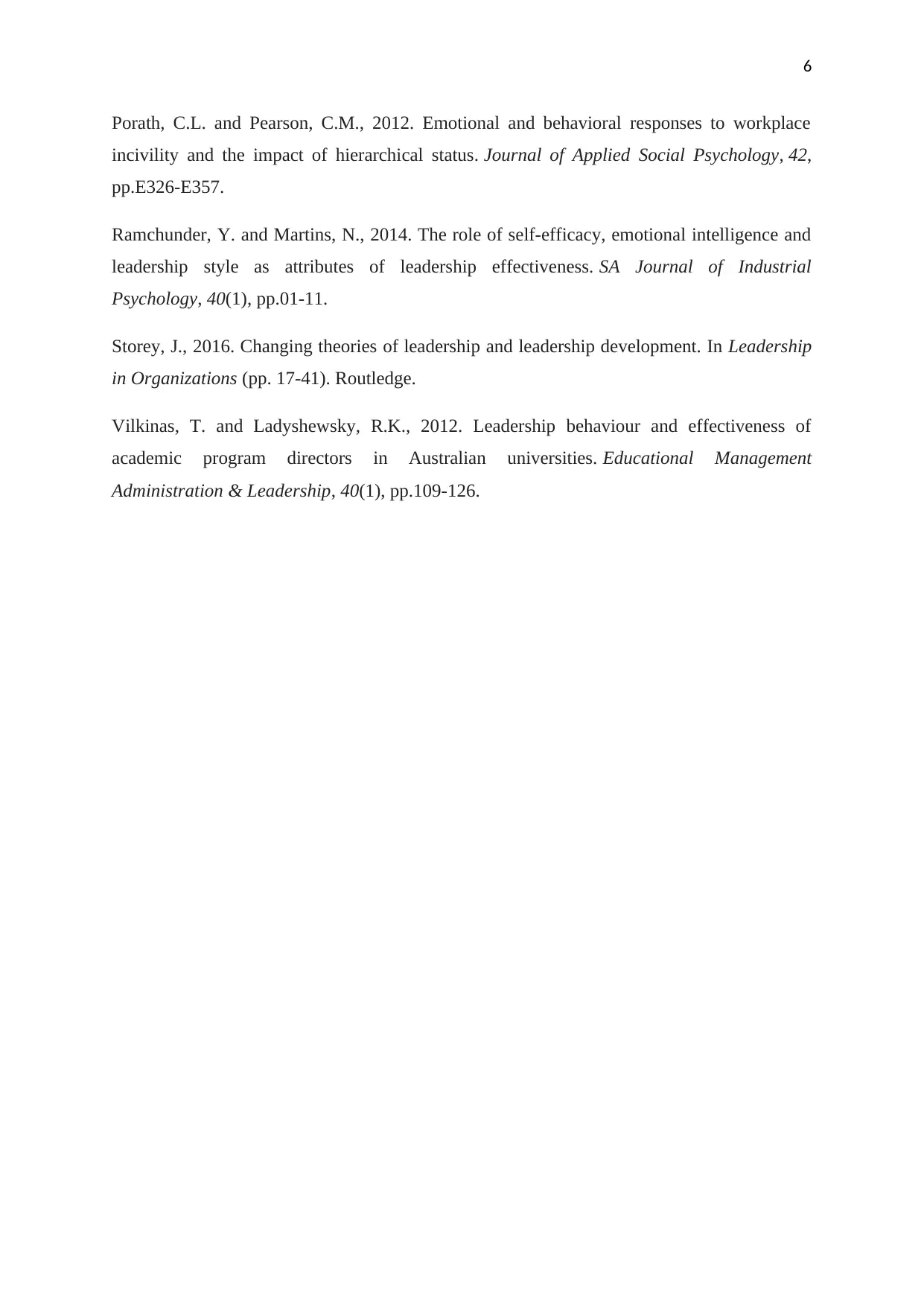
6
Porath, C.L. and Pearson, C.M., 2012. Emotional and behavioral responses to workplace
incivility and the impact of hierarchical status. Journal of Applied Social Psychology, 42,
pp.E326-E357.
Ramchunder, Y. and Martins, N., 2014. The role of self-efficacy, emotional intelligence and
leadership style as attributes of leadership effectiveness. SA Journal of Industrial
Psychology, 40(1), pp.01-11.
Storey, J., 2016. Changing theories of leadership and leadership development. In Leadership
in Organizations (pp. 17-41). Routledge.
Vilkinas, T. and Ladyshewsky, R.K., 2012. Leadership behaviour and effectiveness of
academic program directors in Australian universities. Educational Management
Administration & Leadership, 40(1), pp.109-126.
Porath, C.L. and Pearson, C.M., 2012. Emotional and behavioral responses to workplace
incivility and the impact of hierarchical status. Journal of Applied Social Psychology, 42,
pp.E326-E357.
Ramchunder, Y. and Martins, N., 2014. The role of self-efficacy, emotional intelligence and
leadership style as attributes of leadership effectiveness. SA Journal of Industrial
Psychology, 40(1), pp.01-11.
Storey, J., 2016. Changing theories of leadership and leadership development. In Leadership
in Organizations (pp. 17-41). Routledge.
Vilkinas, T. and Ladyshewsky, R.K., 2012. Leadership behaviour and effectiveness of
academic program directors in Australian universities. Educational Management
Administration & Leadership, 40(1), pp.109-126.
1 out of 7
Related Documents
Your All-in-One AI-Powered Toolkit for Academic Success.
+13062052269
info@desklib.com
Available 24*7 on WhatsApp / Email
![[object Object]](/_next/static/media/star-bottom.7253800d.svg)
Unlock your academic potential
Copyright © 2020–2026 A2Z Services. All Rights Reserved. Developed and managed by ZUCOL.





